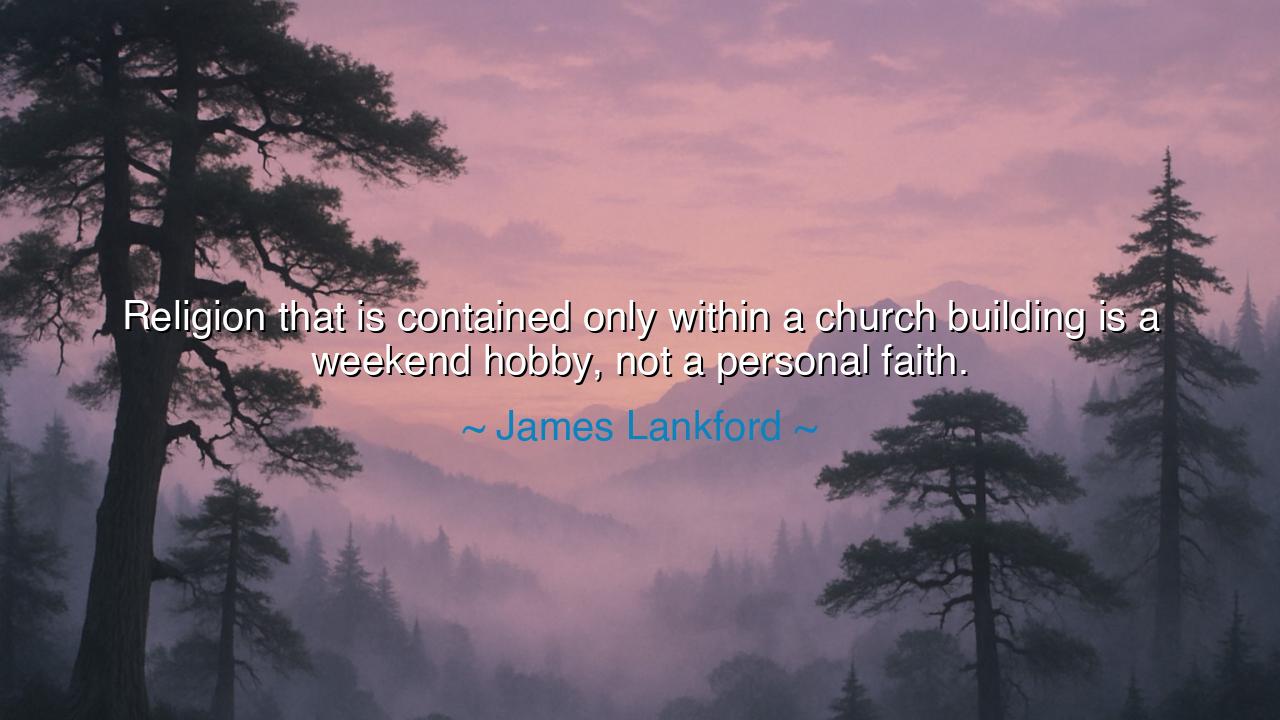
Religion that is contained only within a church building is a
Religion that is contained only within a church building is a weekend hobby, not a personal faith.






Hear now the stern and fiery words of James Lankford, who spoke as one calling out to the distracted hearts of his generation: “Religion that is contained only within a church building is a weekend hobby, not a personal faith.” In this saying is a sharp blade of truth. For what is faith, if it lives only within four walls, breathed only on holy days, and then abandoned like a garment cast aside? Such religion is no fire of the soul—it is a pastime, a ritual of convenience, a hobby rather than a way of life.
From the earliest times, the ancients knew that the gods, the divine, the sacred—these are not confined to stone and wood. The Hebrews, wandering in the wilderness, built a tabernacle that could move with them, for the Holy One was not bound to a temple. The Christians, hounded by Rome, worshipped in catacombs, proving that their faith was not dependent upon great basilicas. The prophets cried aloud in marketplaces, on mountain tops, in city gates. Again and again, history has shown that true faith lives in the heart and actions of the faithful, not in the grandeur of their buildings.
Consider the life of Dietrich Bonhoeffer, the German pastor who, during the rise of the Nazis, refused to let his religion stay locked within church pews. When many bowed to fear, preaching only safe sermons, Bonhoeffer carried his faith into the world, resisting tyranny even unto death. He did not treat his belief as a weekend ritual, but as a flame guiding every choice. His courage was born of a personal faith that refused to be contained. This is the spirit Lankford exhorts us to rediscover.
For what worth is a religion that speaks of love in hymns, yet refuses to love the stranger at the gate? What worth is a faith that preaches mercy in prayers, yet withholds forgiveness in daily life? Such a faith is hollow, a shell of words without breath, a song without soul. But a faith lived each day—in kindness to neighbors, in integrity at work, in courage when tested—that faith is no hobby. It is a living covenant between the mortal and the divine.
The meaning, then, is clear: faith must leave the building. If it does not walk with you into the marketplace, into your home, into the moments of trial and decision, then it is no more than a pastime, a cloak worn for ceremony. But if it shapes your choices, if it governs your speech, if it compels you to serve, forgive, and love, then it is a force that transforms both you and the world around you.
The lesson for us, O listeners, is urgent. Do not keep your convictions hidden within sacred walls. Live your faith daily: in honesty, in service, in humility. Pray with your deeds as well as your lips. Let your work, your friendships, your battles for justice, all bear the seal of your belief. In this way, your life itself becomes a temple, and every act becomes a form of worship.
Practical steps stand before you: Each morning, recall one truth your faith teaches, and choose to live it that day. When confronted with injustice, remember that silence is complicity, and speak as the prophets did. When tempted to keep your religion as a private comfort, ask yourself: Does my faith change the world around me, or merely soothe me for an hour? Let that question pierce your heart until action answers it.
For if you live as Lankford commands, your faith will not be a hobby, nor a ritual, nor a weekend song. It will be a fire that burns in all seasons, a strength that endures in storms, and a testimony that faith, when truly lived, is larger than walls and mightier than words. This is the call of the ancients, and this is the call for today.






AAdministratorAdministrator
Welcome, honored guests. Please leave a comment, we will respond soon